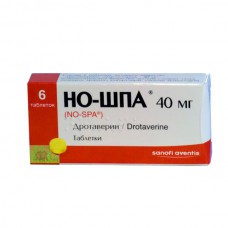Expiration date: 11/2028
Active substance: Drotaverine
Pharmachologic effect:
Antispasmodic. Drotaverinum - isoquinoline derivative which exhibits an antispasmodic effect on smooth muscle by inhibiting the enzyme phosphodiesterase 4 (PDE4). PDE4 enzyme inhibition leads to elevated cAMP concentration that inactivates myosin light chain kinase (MLCK), which in turn leads to smooth muscle relaxation.
Drotaverinum inhibit PDE4 in vitr enzyme without inhibiting PDE5 and PDE3 isozymes. Apparently, PDE4 functionally very important to reduce the contractility of smooth muscle, so selective PDE4 inhibitors may be effective in the treatment of hyperkinetic disorders and diseases associated with spasms of the gastrointestinal tract.
The enzyme hydrolyzes cAMP in smooth muscle cells and vascular infarction is predominantly a PDE3 isoenzyme which explains the high efficiency as a spasmolytic drotaverine expressed in the absence of action on the cardiovascular system and serious cardiovascular side effects. The drug is effective in spasms of smooth muscles like the nervous and muscular etiology. Regardless of the type of autonomic innervation Drotaverinum effect on the smooth muscles of the gastrointestinal tract, biliary tract, and urogenital and circulatory systems. Due to vasodilator action but-shpa® improves blood flow to the tissues.
Pharmacokinetics:
Absorption and distribution
If ingestion and parenteral administration Drotaverinum rapidly and completely absorbed. Cmax is reached within 45-60 min. Bound to plasma proteins (albumin, alpha, alpha and beta globulins).
Metabolism and excretion
It is metabolized in the liver. T1 / 2 -. After 72 hours, 16-22 hours drotaverine excreted mainly as metabolites, 50% - in the urine and 30% - in the feces.
Testimony:
- Smooth muscle spasms associated with biliary tract diseases: cholelithiasis, cholecystitis, pericholecystitis, cholangitis, papillitis
- Spasms of smooth muscles of the urinary system: urolithiasis, pyelitis, cystitis, tenesmus bladder
- During physiological delivery - shortening phase of cervical dilatation and thereby reducing the total duration of labor (for solution for the on / in and / m introduction).
As an adjuvant therapy:
- Spasm in the digestive tract smooth muscles: stomach ulcer and duodenal ulcer, gastritis, spasms of cardia and pylorus, enteritis, colitis, accompanied by constipation and flatulence
- Tension headaches (Oral)
- Gynecological diseases (dysmenorrhea)
- Strong labor pains (for solution for the on / in and / m introduction).
When used as an adjuvant formulation is administered parenterally at the impossibility of the use of tablets.
Dosage and administration:
Adults when administered the recommended daily dose is 120-240 mg (2-3 hours) for children the dose adjusted according to the age, for children aged 1 to 6 years - 40-120 mg (2-3 hours) in 6 years - 80-200 mg (in 2-5 receptions).
Average daily dose for i / m administration to adults is 40-240 mg (divided into 1-3 injection / day). For acute colic (kidney or bile), the drug is introduced into / in a dose of 40-80 mg.
For shortening phase cervical dilatation during labor administered in physiological / m to 40 mg, with an unsatisfactory effect can be repeated one time for 2 hours.
Side effects:
- From the digestive system: rarely - nausea, constipation.
- CNS: rarely - headache, dizziness, and insomnia.
- Since the cardiovascular system: rarely - palpitations very rarely - hypotension.
- Other: very rarely - allergic reactions (for parenteral administration, particularly in patients with hypersensitivity to the bisulfite).
Contraindications:
- Severe renal insufficiency
- Severe hepatic impairment
- Severe heart failure (low cardiac output syndrome)
- Children under the age of 1 year (for tablets)
- Hypersensitivity to Drotaverinum or any excipient of the drug (in particular to sodium metabisulfite - for a solution for in / and the / m).
With care use in patients with hypotension. The on / in the introduction of the drug the patient should be in a prone position because of the danger of collapse.
Pregnancy and lactation:
Drotaverinum not teratogenic and embryotoxic action. However, it is recommended to use the drug only after careful weighing of the expected benefits and the ratio of the possible risk.
Due to the lack of clinical data Drotaverinum not recommended during lactation (breastfeeding).
Special instructions:
The tablet composition includes 52 mg of lactose, and the drug in tablet form is not assigned to patients with lactase deficiency, galactosemia syndrome or disturbed absorption of glucose / galactose.
The composition of the solution for the on / in and / m introduction includes sodium bisulfite, which can cause allergic reactions, including anaphylaxis and bronchospasm in susceptible individuals (especially in patients with bronchial asthma or allergic reactions in the anamnesis). If hypersensitivity to sodium metabisulfite parenteral administration of the drug should be avoided.
Effects on ability to drive vehicles and management mechanisms
When administered at therapeutic doses Drotaverinum does not affect the ability to occupations potentially hazardous activities.
Following parenteral (especially w / w) injection is recommended to refrain from driving motor vehicles, and control mechanisms for 1 hour (after application).
Overdose:
So far, cases of drug overdose, but shpa® were reported.
Drug Interactions:
At simultaneous application But-shpa® can reduce the antiparkinsonian effect of levodopa.
Conditions and terms:
Pills in blister packs should be stored at a temperature not exceeding 30 ° C.
Tablets in a polypropylene vial and solution in / in and / m introduction should be kept in the dark, out of reach of children at a temperature of 15 ° to 25 ° C. Shelf life - 5 years.








